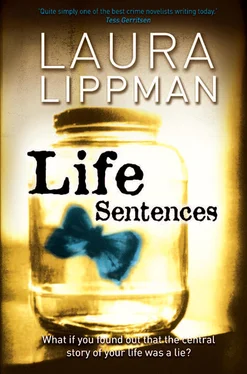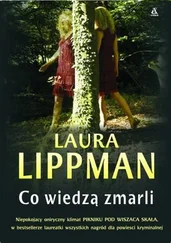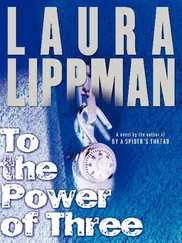That was where Cassandra’s memories of Callie started—and stopped. How could that be? For the first time, Cassandra had some empathy for the neighbors of serial killers, the people who provided the banalities about quiet men who kept to themselves. Someone she knew, someone who had probably come to her birthday parties, had grown up to commit a horrible crime, and all Cassandra could remember was that…she was a quiet girl. Who kept to herself.
Fatima had known her well, though, because she had once lived in the same neighborhood. And Cassandra remembered a photograph from the last-day-of-school picnic in fourth grade, the girls lined up with arms slung around one another’s necks, Callie at the edge. That photo had appeared, in fact, along with several others on the frontispiece of her first book, but only as testimony to the obliviousness of youth, Cassandra’s untroubled, happy face captured mere weeks before her father tore their family apart. Had she even mentioned Calliope in passing? Doubtful. Callie simply didn’t matter enough; she was neither goat nor golden girl. Tisha, Fatima, Donna—they had been integral to Cassandra’s first book. Quiet Callie hadn’t rated.
Yet she was the one who grew up to have the most dramatic story. A dead child. Seven years in jail, refusing to speak. Who was that person? How did you go from being Quiet Callie to a modern-day Medea?
Cassandra glanced at the clock. Almost five here, not yet eight in New York, too early to call her agent, much less her editor. She pulled on the hotel robe and went over to the desk, where her computer waited in sleep mode. She started an e-mail. The next book would be true, about her, but about something larger. It would include her trademark memories but also a new story, a counterpoint to the past. She wouldn’t track down just Callie but everyone she could remember from that era—Tisha, Donna, Fatima.
Cassandra was struck, typing, by how relatively normal their names had been, or at least uniform in spelling. Only Tisha’s name stuck out and it was short for Leticia, which might explain why she had been so quick to save Calliope with a nickname. Names today were demographic signifiers and one could infer much from them—age, class, race. Back then, names hadn’t revealed as much. Cassandra threw that idea in there, too, her fingers racing toward the future and the book she would create, even as her mind retreated, hopscotching through the past, to fourth grade, then ninth grade, back to sixth grade—her breath caught at a memory she had banished years ago, one described in the first book. What had Tisha thought about that ? Had she even read My Father’s Daughter ?
Yet Callie would be the central figure of this next book. She must have done what she was accused of doing. Had it been a crime of impulse? An accident? How had she hidden the body, then managed not to incriminate herself, sitting all those years in jail? Was there even a plausible alternative in which Callie’s son was not dead? Was she protecting someone?
Cassandra glanced back at the television screen, watched Callie come around again. Cassandra understood the media cycle well enough to know that Callie would disappear within a day or two, that she was a place-marker in the current story, the kind of footnote dredged up in the absence of new developments. Callie had been forgotten and would be forgotten again. Her child had been forgotten, left in this permanent limbo—not officially dead, not even officially missing, just unaccounted for, like an item on a manifest. A baby, an African-American boy, had vanished, with no explanation and yet no real urgency. His mother, almost certainly the person responsible, had defeated the authorities with silence.
That’s good , Cassandra told herself. She put that in the memo, too.
I didn’t speak until I was almost three years old. And then it was only because my mother almost killed me. Almost killed both of us, but she had the luxury of making the decision. I was literally just along for the ride.
My mother didn’t worry about my silence, however. It was my father, a classics professor at Johns Hopkins University, who brooded constantly. The possibility of a nonverbal child—and all the other intellectual limitations that this circumstance implied—terrified my father so much that he would not allow my mother to consult specialists. He knew himself well enough to understand that a diagnosis could change his love for me. My father believed in unconditional love, but only under certain conditions.
Besides, he was not irrational to hope that I might be keeping my own counsel for as yet undisclosed reasons. I had walked early and hit the other developmental milestones more or less on time. And I wasn’t mute. I had a three-word vocabulary: yes, no , and Ric , which is how my father, Cedric, was known. I’m not sure why I had no term for my mother. Perhaps ‘Lenore’ was too subtle for my baby mouth. More likely, I didn’t recognize that my mother was a separate entity but saw her as my larger self, capable of detaching from my side in order to meet my needs. With her, I didn’t even use my three paltry words, instead pointing and grunting to indicate my desires. ‘We should have named her Caliban instead of Cassandra,’ my father said.
My refusal to speak continued until almost a month before my third birthday. It had snowed, an early-spring snowstorm that was uncommonly common in Baltimore. On this particular day—a Thursday, not that my three-year-old mind could distinguish days, but I have checked the family story against newspapers from that week—my mother set out to do the marketing, as she called it then, at the old Eddie’s supermarket on Roland Avenue.
The snow had started before she set out, but the radio forecaster was insisting it would not amount to much. In the brief half hour she shopped, the snow switched to rain, then changed over to sleet, and she came out to a truly treacherous world, with cars spinning out of control up and down Roland Avenue. She decided that the main roads would be safer and calculated a roundabout route back to our apartment. But she had forgotten that Northern Parkway, while wide and accommodating, was roller-coaster steep. The car slithered into its left turn onto the parkway, announcing how dangerous her choice was, but it was too late to turn back. The unsanded road lay before her, shining with ice, a traffic light at its foot. A traffic light at which she would never be able to stop. What to do?
My pragmatic, cautious mother killed the engine, took her foot off the brake and coasted down, turning our car, a turquoise-and-brown station wagon, into a toboggan. I bobbled among the sacks of groceries, unmoored and unperturbed. The car picked up speed, more speed than my mother ever anticipated, yet not enough to get her through the intersection before the light changed to red. She closed her eyes, locked her elbows, and prayed.
When she opened her eyes, we had come to rest in the tiny front yards of the houses that lined Northern Parkway, shearing off a hydrant, which sent a plume of water into the air, the droplets freezing as they came back to earth, hitting our car like so many pebbles. But the last might be a detail that my father added, as he was the one who told this story over and over. Careful Lenore, rigid Lenore, skating down a hill with her only child in the back of the car. My mother could barely stand telling it even once.
That night, at dinner, decades later as far as my mother was concerned—after the police came, after the car was towed, after we were taken to our apartment in a fire truck, along with the groceries, not so much as an egg cracked—my father finished his characteristically long discourse on his day in the groves of academe, which my father inevitably called the groves of academe. Who had said what to whom, his warlike thrusts, as he called his responses, an allusion to Maryland’s state song. His day finally dispatched, he asked, as he always did, ‘Anything to report from the home front?’
Читать дальше












